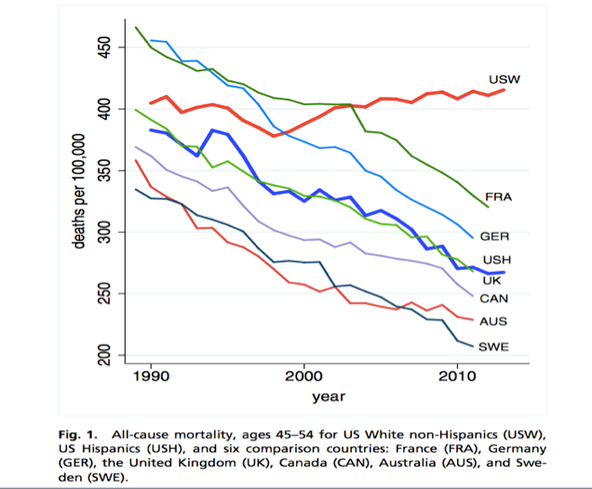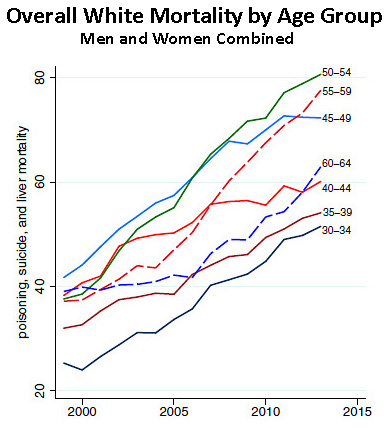Sunday, 22 November 2015 - 2:10pm
This week, I have been mostly reading:
- Heartland of Darkness - Paul Krugman, New York Times:

What the data look like is a society gripped by despair, with a surge of unhealthy behaviors and an epidemic of drugs, very much including alcohol. This picture goes along with declining labor force participation and other indicators of social unraveling. Something terrible is happening to white American society.
And Kevin Drum at Mother Jones points out that it's not just middle-aged men:
Bear in mind the measure on the vertical axis has changed, but still it's seriously weird. I can't even begin to speculate about what's going on. - Digital Tutoring is Linked to Lower Achievement for Some Students - A summary of research by Patricia Burch and Annalee Good and Carolyn Heinrich. By Sarah Garcia in The Society Pages:
Burch, Good, and Heinrich examined the digital providers’ role in out-of-school time (OST) tutoring. They completed a mixed-method longitudinal study of federally funded OST tutoring companies in five urban sites over four years and found that these companies had a reach as high as 88% of students in one district. The study sample included students eligible for OST tutoring under No Child Left Behind. They examined student attendance patterns and the relationship of different digital provider characteristics and access points to the reading and math achievement outcomes of students from low-income families.
- #Occupy the university - Marko Beljac in On Line Opinion:
In neoliberal society only that which commands the assent of the market, which means corporations and the rich who have the capacity to provide ready demand, are permitted to exist. Cultural studies graduates are not demanded by the rich so literary and cultural studies courses are closed. This might enrich universities and businesses but it impoverishes all of us.
- The Future of the BBC: the BBC as Market Shaper and Creator - Mariana Mazzucato in the LSE Media Policy Project Blog:
The assumption is that there is an existing market, and if the BBC takes a larger chunk of it, there is less left for the private sector, and this leads to criticisms that active public organizations like the BBC not only crowd out but also stifle innovation. In fact, […] the public sector not only ‘de-risks’ the private sector by sharing its risk, it often ‘leads the way’‒ courageously taking on risk that the private sector fears. Thus rather than analysing public sector investment via the need to correct ‘market failures’ it is necessary to build a theory of how the public sector shapes and creates markets—as it has done in the history of the IT revolution.
- Students in Debt, Professors in Poverty -- What's Going Wrong? - Laurie Jones and
Wanda Evans-Brewer at HuffPo:
About 22 percent of adjunct professors live BELOW the poverty line. That does not account for the thousands of others who live at or just above it, in a US economy who's "poverty line" would actually have to be doubled in the majority of it's cities for a family of three to afford basic living necessities. In short, many adjuncts are poor. With well over a 40 hour work week preparing curriculums, grading papers, and writing lectures, their pay generally averages out to about $10.00 an hour.
- George H.W. Bush Was So Bored by Peace He Wanted to Quit - Jon Schwarz, The Intercept:
What’s even more important, and even more frightening, is that it’s not just Bush. It’s most of official Washington, D.C. that finds peace unbearably dull, and war the only thing that lends zest to their gray lives.
- Day Before Deadly Bombing, U.S. Official Asked if Any Taliban Were “Holed Up” At MSF Hospital - Murtaza Hussain:
As the attack continued, despite increasingly frantic communications by MSF to the U.S. military informing them that the hospital was under bombardment, desperate staff were forced to operate on their own grievously injured co-workers. […] According to the accounts of MSF staff, throughout the bombing the American AC-130 continued to circle the compound, targeting individuals as they tried to flee the main hospital building, with “medical staff [shot] while running to reach safety in a different part of the compound.”
- A timeless tonic for our modern malaise? Stoicism may be the way forward - Jane Goodall (not that one; an adjunct professor from Western Sydney University) in The Conversation:
If the situation is not in your control, the most effective thing to do is to focus your strength on maintaining your own psychological composure. That will contribute to mental clarity, which […] can be effective in actually turning the situation to your advantage.
- 'Worse Than We Thought': TPP A Total Corporate Power Grab Nightmare - Deirdre Fulton, Common Dreams: Well I for one always thought it would be worse than I thought.
- Austerity’s Grim Legacy - Paul Krugman, New York Times:
For those who don’t remember (it’s hard to believe how long this has gone on): In 2010, more or less suddenly, the policy elite on both sides of the Atlantic decided to stop worrying about unemployment and start worrying about budget deficits instead. This shift wasn’t driven by evidence or careful analysis. In fact, it was very much at odds with basic economics.
- Europe’s challenges in a global context – Interview with Dirk Pohlmann, KenFM - Yanis Varoufakis: Softball questions, but an entertaining, wide-ranging interview.